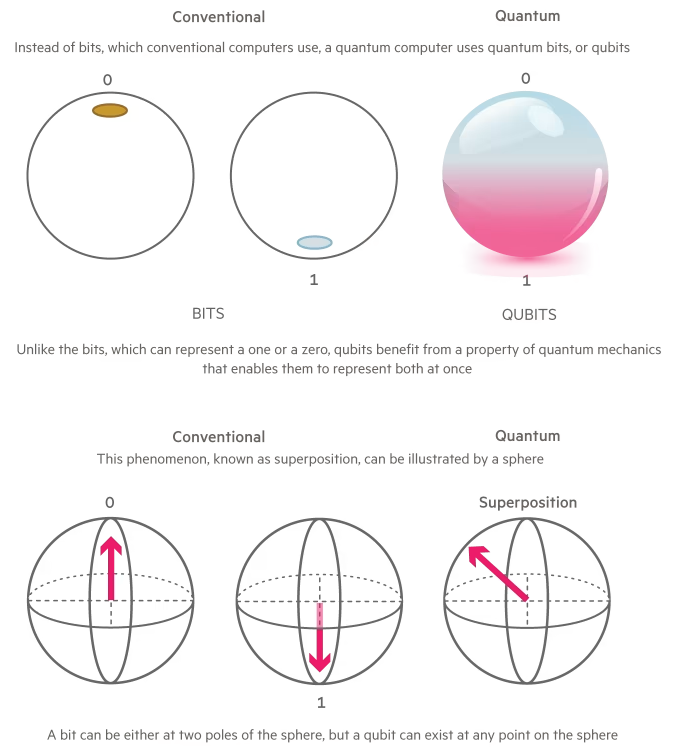Syllabus: GS3/Science & Technology
Context
- Recently, Microsoft has unveiled its groundbreaking quantum computing chip, Majorana 1, marking a significant leap in the field of quantum technology.
Understanding Quantum Computing
- Quantum Computing represents a paradigm shift in the field of computing, promising exponential speed-ups for certain types of problems that classical computers struggle with.
- It is based on quantum mechanics—the branch of physics that deals with subatomic particles.
Working of Quantum Computers
- Quantum computers leverage quantum bits or qubits, which exploit the principles of superposition, entanglement, and quantum interference to perform calculations at unprecedented speeds, process vast amounts of data and make them ideal for solving complex problems.
- Superposition: A qubit can exist in multiple states simultaneously, and can be both 0 and 1 at the same time, exponentially increasing computing power.
- Traditional computers use binary bits (0s and 1s).
- Entanglement: The state of one qubit is instantly correlated with another, regardless of distance, when qubits become entangled. It enables ultra-fast information transfer.
- Quantum Interference: By manipulating quantum states, computations can be optimized to produce highly efficient results.
- Superposition: A qubit can exist in multiple states simultaneously, and can be both 0 and 1 at the same time, exponentially increasing computing power.

Potential Applications of Quantum Computing
- Cryptography: Quantum computers can break traditional encryption algorithms, necessitating the development of quantum-safe cryptographic methods.
- Healthcare and Drug Discovery: Quantum computing can simulate molecular interactions at an atomic level, accelerating the discovery of new drugs and treatments.
- Artificial Intelligence (AI) and Machine Learning: Quantum algorithms can enhance AI models by solving optimization problems much faster than classical computers.
- Financial Modeling: Quantum computers can analyze vast datasets to predict market trends with greater accuracy.
- Climate Modeling: Quantum simulations can improve climate predictions by analyzing complex atmospheric interactions.
Key Milestones
- IBM’s Qiskit: It is an open-source quantum computing framework, allows researchers and developers to experiment with quantum algorithms.
- IBM Eagle Processor (world’s first 127-qubit processor) and Condor (in 2023).
- Microsoft’s Quantum Computing Approach:
- Quantum Development Kit (QDK): A platform that allows developers to build quantum applications using the Q# programming language.
- Topological Qubits (highly stable qubits with lower error rates).
| Majorana 1 – It uses a new class of materials called topoconductors, which enable the creation of topological qubits (Topological Core Architecture). 1. These qubits are more stable and less prone to errors compared to traditional qubits. – Innovative Material Stack: The chip is built using a combination of Indium Arsenide (a semiconductor) and Aluminum (a superconductor), creating a pristine environment for Majorana particles. |
Challenges and Concerns
- Hardware Limitations: Maintaining quantum coherence in qubits is extremely difficult due to environmental interference.
- Error Correction: Quantum computers are highly susceptible to errors, requiring sophisticated error-correction techniques.
- Scalability: Building large-scale quantum systems that outperform classical computers remains a challenge due to the need for advanced cryogenic technology, making their development and maintenance highly expensive.
- Security Risks: Quantum computers could break existing encryption algorithms, necessitating new cryptographic standards.
Quantum Computing Research in India
- National Quantum Mission (NQM): With budget outlay of Rs.6003.65 crore from 2023-24 to 2030-31.
- It aims to work towards strengthening India’s research and development in the quantum arena alongside indigenously building quantum-based (physical qubit) computers.
- National Mission on Quantum Technologies & Applications (NM-QTA): It was announced in the Union Budget (2020) with an allocation of ₹8,000 crores.
- Research institutions such as the Indian Institute of Science (IISc) and IITs are advancing quantum computing research.
- Department of Science and Technology (DST): It has launched various projects focused on quantum communication, quantum cryptography, and quantum materials.
- Quantum-enabled Science & Technology (QuEST) is for fostering quantum research and capacity building.
- Centre for Development of Advanced Computing (C-DAC) and the DRDO are exploring quantum computing applications for national security and defense.
Previous article
Government to Lease Out 10 Airports via PPP Model
Next article
News In Short-21-02-2025